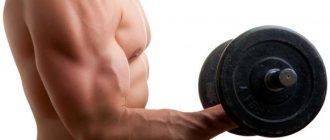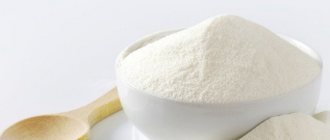The importance of proteins for the human body
Proteins play an important role in human life. After all, proteins are responsible for vital functions in the human body. The construction of cells and organs occurs due to this material. In addition, these substances significantly strengthen the immune system. Proteins are also part of hormones, enzymes, antibodies and other formations involved in the most important biochemical processes of life.
Proteins play an important role in human life
Lack of proteins leads to dysfunction of the liver, pancreas, small intestine, nervous and endocrine systems. In addition, disturbances in hematopoiesis, fat and vitamin metabolism are observed, and muscle atrophy develops. A person’s performance deteriorates and his resistance to infections decreases. Protein deficiency has a particularly adverse effect on a young body: its muscle growth slows down, bone formation is disrupted, and mental development is delayed.
Excess protein intake also has a negative effect on the body. At the same time, the cardiovascular system, liver and kidneys suffer, the processes of decay in the intestines intensify, and metabolism is disrupted. You should eat foods rich in proteins in moderation so as not to cause side effects. Increasing protein in the daily diet is necessary when a person leads an active lifestyle or plays sports.
Note! Unlike fats and carbohydrates, proteins do not accumulate in reserve and are not formed from other nutrients; they are an irreplaceable part of food.
What is protein and its benefits for the human body
Protein, also called protein, is a valuable reserve, without which the full functioning of biological tissues in the human body is impossible. Protein is involved in all vital metabolic processes of cells. It also plays a primary role in the production of enzymes, immune antibodies, hormones and other compounds.
Protein is a high molecular weight polymer compound. A protein molecule is represented by a peptide chain of amino acids, of which there are about 20 pieces. Eight of them are essential - not synthesized by the body, but supplied with food.
Benefits of protein foods for humans:
- normalize metabolism, maintaining body weight within normal limits;
- control the feeling of hunger, satiating quickly and for a long time;
- restore healthy digestion;
- promote the breakdown of fat deposits;
- stimulate muscle gain;
- have a beneficial effect on bones, preventing the loss of calcium;
- lower blood pressure.
It is not without reason that protein is used in many weight loss diets. A high-protein diet has a detrimental effect on excess weight due to increased metabolism. The desire to snack between main meals disappears, since the feeling of hunger does not arise for a long time.
Due to the regenerating properties of the protein, damaged tissues are restored faster. Proteins are valuable in terms of muscle building. Along with this, they increase physical endurance.
https://youtu.be/Gvkuhk1hflg
How many grams of protein per day do you need for muscle growth?
The main building material for muscle growth is protein. To gain muscle mass, you must follow a certain regimen. Many people are interested in how much protein a person needs per day for muscle growth. Recommended standards are approved by Rospotrebnadzor in “Methodological recommendations 2.3.1.2432-08”. This document states that the physiological requirement for protein for adult men is from 65 to 117 grams per day, and women should consume from 58 to 87 grams of this substance per day.
Considering that the average weight of a woman ranges from 60 to 70 kilograms, and a man from 70 to 90 kilograms, then you should consume about 1.2-1.5 grams of protein per kilogram of weight. At the same time, foreign nutritionists advise consuming 1.4-1.8 grams for those athletes who engage in strength training and 1.2-1.4 grams for those who prefer endurance sports.
Proteins are needed for muscle growth
The muscles of an adult have a number of features:
- The cells of the human body are constantly renewed. The renewal of proteins in the muscles occurs over 180 days, so after three months, the muscles will consist entirely of new proteins;
- The muscle mass in the body of the average man who does not lead an active lifestyle is about 50% of his total body mass. Athletes can boast of a different indicator. For them this figure can reach up to 70%. Basically, we are talking about bodybuilders;
- muscles, on average, are 20% protein and 80% water and everything else. Thus, in 100 gr. muscle will be approximately 20 grams. protein, but this amount is quite large.
High protein foods
In most cases, the cheapest high protein foods are eggs, meat and fish. The decisive role is played by both the significant amount of protein per 100 g (for meat this is about 15-25 g), as well as the presence of essential amino acids and the final percentage of absorption. Sports nutrition, in turn, is one of the most expensive types of protein.
As for the protein content in plant sources, even the confident champion, buckwheat, contains about 13 g of protein per 100 g of dry cereal. However, taking into account the percentage of absorption, this is equivalent to only 30-50 g of meat. At the same time, most other sources of plant protein both contain less protein and do not contain essential amino acids important for metabolism.
Cost of 1 gram of protein in food:
- Chicken eggs - 0.8-1.5 rub.
- Chicken - 0.8-1 rub.
- Semi-finished meat products—1.7-2 rub.
- Pork - 1.5-2 rubles
- Beef —1.7-2 rub.
- Fish - 1.5-2.5 rub.
- Milk - 1-1.4 rubles
- Cheese and cottage cheese - 1-1.6 rubles
- Rice - 0.8-1 rub.
- Beans - 0.5-0.8 rub.
- Pasta - 0.3-0.6 rub.
- Buckwheat - 0.3-0.6 rub.
- Peas - 0.2-0.5 rub.
***
Most current recommendations suggest that consuming 1.3–1.8 grams of protein per kilogram of lean body weight is sufficient for muscle growth and maximum stimulation of protein synthesis in the body. At the same time, the amount of protein can be increased by athletes during extremely intense training and during cutting, which involves giving up carbohydrates and limiting calories.
Scientific sources:
- Norms of physiological needs for energy and nutrients for various groups of the population of the Russian Federation, link
- Gluconeogenesis and energy expenditure after a high-protein, carbohydrate-free diet, source
- International Society of Sports Nutrition Position Stand: protein and exercise, source
How to correctly calculate the daily requirement for gaining muscle mass for a man
The daily protein requirement for gaining muscle mass for men should be at the level of 1.5-2.5 g per 1 kg of weight. A man who is losing weight should know how much protein he needs to eat per day to grow muscles. You should start the course with a minimum amount, carefully monitoring muscle growth; if the result is insufficient, the amount of protein in the diet can be gradually increased. In general, it is recommended to eat lean animal and plant sources of protein, either individually or in combination. It can be chicken breast, fish, beef, egg whites, cottage cheese up to 9% fat, beans, chickpeas, lentils.
The daily protein requirement for gaining muscle mass for men should be at the level of 1.5-2.5 g per 1 kg of weight
Protein calculations for men are performed with the goal of increasing muscle weight. In this case, the use of protein shakes is allowed. These products give maximum effect in building muscles. But you need to consume only healthy omega-6 and omega-3 fats. To keep fat levels within normal limits, it is important to stew and boil foods rather than fry them.
Important! When gaining muscle mass, you should not limit yourself to drinking. The amount of liquid should be at least two liters, but it is not recommended to include sugary drinks in the diet.
Digestion speed and quality of protein source
A common concern among gym enthusiasts is the rate of digestion/absorption of protein sources.
Let's dispel some myths and start with the facts on this topic.
How protein is absorbed by the body
The digestion process for any food begins in the mouth, which is mainly responsible for physically breaking down what you eat.
After your teeth have done their dirty work, the food pieces are sent to your stomach, where the next step of digestion occurs.
The stomach contains stomach acid, which acts to denature (break down) proteins and activate essential digestive enzymes (such as pepsin and chymotrypsin), which break down proteins into smaller polypeptides.
These polypeptides are now sent to your duodenum, which is part of the intestinal tract. This particular part of your intestines is filled with digestive enzymes that further break down polypeptides into di-/tri-peptides and isolated amino acids; Most protein digestion occurs here.
These separated amino acids and small peptides can now either enter your intestinal cells or travel all the way to the liver.
Once arriving at your liver, amino acids can be routed in numerous metabolic directions according to your body's energy requirements (eg, for protein synthesis, as a substrate for gluconeogenesis, etc.).
Does all the digestible protein go to muscle protein synthesis?
Now that we have a much better understanding of protein digestion, it must be noted that not all of those isolated amino acids and shorter peptides will go towards creating new muscle tissue/muscle protein synthesis.
Simply put, eating 100 grams of protein will not lead to more growth than a more modest amount. Based on research, 30-40 grams of leucine-rich protein (such as most animal and dairy proteins) is enough to maximize the muscle protein synthesis response for at least 3-5 hours - with minor exceptions that will be described a little later.
This doesn't mean you should limit your protein intake to 30 grams per meal for optimal muscle growth.
Big people obviously need more and vice versa.
Moreover, protein that does not lead to protein synthesis is still biologically useful for other roles in your body.
However, consuming an exorbitant amount of protein in a single meal (eg, 200+ grams) will likely result in a large percentage of those amino acids being oxidized and sent to the liver for gluconeogenesis and/or excretion.
Protein sources and absorption rate
If we consume what constitutes a “best” or “high quality” protein source, we are looking for a protein that maximizes muscle protein synthesis in a given meal and a protein that is highly absorbable/digestible.
Good sources of protein:
- Red meat: dry steak, beef and fillet
- Poultry: turkey, chicken breast, turkey breast, eggs
- Fish: tuna (canned), salmon, white fish
- Dairy products: cottage cheese, milk, whey protein isolate, low-fat yogurt
- Nuts: almonds, cashews, walnuts, pistachios
The higher the biological value of the protein, the more is absorbed and converted into new muscle tissue.
Muscle protein synthesis is differentially stimulated in proportion to essential amino acids in food, especially L-leucine - an amino acid that claims to be the main factor in stimulating muscle protein synthesis, which leads to muscle adaptation.
Therefore, by mixing multiple incomplete protein sources into your meals, you can achieve an optimal protein synthesis response as long as you consume all the essential amino acids you need.
What's more, the study demonstrated that mixing protein sources could be more effective for your protein needs than living on one source sequentially.
For example, whey protein's abundant leucine content combined with the sustained release protein casein can provide a continuous increase in protein synthesis for many hours after consumption, something that won't happen if you consume whey protein exclusively.
For this reason, it is not wise to define just one protein source as the absolute best solution. A myriad of different protein sources are more beneficial for muscle growth.
In fact, a vegetarian can build a lot of muscle mass, provided they consume enough essential amino acids (and total grams of protein). However, whey protein is definitely a premium source of essential amino acids (especially L-leucine).
As mentioned earlier, these suggestions serve as a starting point for active gym enthusiasts who want to build muscles. Various factors such as body weight, sex, age, genetics, and anabolic steroid use modify your exact protein needs.
Feel free to do a little experiment to figure out what the optimal protein intake is for your body.
As a rule of thumb, remember these tips:
- Aim for approximately 2.5 to 2.7 grams of protein per kilogram of your body weight.
- It is advisable to take at least 30 grams or more of high-quality protein with each meal.
- To build muscle mass, consume at least four to five protein-rich meals a day, about three to four hours apart.
Myths about eating protein to increase muscle mass
How much protein we should consume to gain muscle mass has been debated for decades.
Over the years, a number of myths related to this topic have emerged.
This question is most often asked by people who are new to bodybuilding. And even some experienced bodybuilders argue over the question of how much protein you should eat.
I have already shown you the numbers, this issue is now going to rest.
Getting enough protein every day will help you build and maintain muscle, coupled with proper training and rest.
Myth 1: High protein diets can damage your kidneys.
The fact is that there is not a single solid study that shows that high protein intake causes any kidney damage or dysfunction in healthy people. This myth has spread because some people with pre-existing kidney problems have experienced stress on their kidneys when consuming protein.
The International Journal of Sports Nutrition published a study that looked at the kidney function of athletes and bodybuilders who followed a high-protein diet. Blood and urine tests on a protein-rich diet found that their kidney function remained within the normal range.
Myth 2: You can only digest 30 grams of protein per meal
There is a long-standing myth that we can only digest and use 30 grams of protein per meal. I've heard people throw around different numbers from 20 to 50 grams, but the most popular number at the moment seems to be 30 grams.
It doesn't matter if you eat 20, 30, or 80 grams of protein per meal, your body will digest and absorb it all. Will your body use all 80 grams of protein per meal to build muscle?
No, probably not, but it will absorb it all and use what it needs to repair damaged muscle tissue.
Protein plays many roles in the human body other than building muscle. Protein is the building blocks of the body, muscles, skin and hair. It's all made from protein.
How much protein goes into the muscles depends on how much the body needs to recover and grow from intense weight training.
As long as you get enough protein to recover and meet your protein synthesis needs in response to training, you will grow.
Any additional protein consumed will go to other functions in the body, be used as energy, or be excreted from the body.
Myth 3: Too much protein will make you fat.
Protein is a macronutrient responsible for many functions in the body, from DNA replication to molecular transport. Protein alone will not make you fat. But by eating extra calories - yes.
Increasing the amount of protein you take in will not cause you to gain excess body fat because the pathways through which protein can be converted into fatty acids are so few that it will not cause fat storage.
However, protein contains calories, about 4 calories per gram. This is quite low compared to fat, which contains 9 calories per gram. Now, when you eat protein, it releases a hormone called glucagon, which causes a fat-burning effect. In addition, glucagon helps stabilize blood sugar levels.
Protein also has a thermogenic effect, which helps in burning calories.
Department of Nutrition, Harvard School of Public Health:
There is strong evidence that higher intake increases protein thermogenesis and satiety compared to a reduced protein diet. The weight of evidence also suggests that high protein diets lead to lower subsequent energy intake. Some evidence suggests that high protein diets lead to increased weight loss and fat loss compared to low protein diets.
Increasing your protein intake is a great way to stimulate fat burning.
Calorie for calorie, it requires more energy than fat or carbohydrates.
According to a study found in the Journal of Obesity, high protein diets may have a positive effect on metabolism. It also helps you feel fuller longer.
The happier you are, the less likely you are to overeat.
Remember, macronutrients such as proteins, carbohydrates and fats will only cause obesity if more of their energy (in the form of calories) is consumed than your body burns.
Conclusion
You need to eat about 80 grams of protein per 90 kilograms of body weight per day.
The Institute of Medicine recommends 56 grams of protein per day for men ages 19 to 70.
These numbers are not very helpful for us who want to build muscle because this study is based on the average person who prefers a sedentary lifestyle.
If you're training hard and lifting weights with the goal of building muscle, a rule of thumb that has proven to be effective is that you should eat at least 2.5 grams (2.6 grams is ideal) of quality protein per kilogram of body weight daily.
So if you weigh 80 kilograms, you should consume about 200 grams of protein throughout the day to build muscle mass. By consistently maintaining a high-protein diet and eating 30 – 40 grams of protein at each meal, achieving your daily goal should be easy.
Andrew
Welcome to IronSet, a blog about sports and healthy trends. Andrey is a writer and sports consultant who contributes to our blog.
Advice from nutritionists
Typically, nutritionists advise those trying to lose weight while building muscle the following:
- The day should start with a protein breakfast. This will ensure a feeling of fullness, so the person will not soon get hungry and will not try to eat something at an “inopportune” time. A well-known fact: in the first half of the day, proteins are absorbed better;
- combine protein foods correctly. This will allow you to dilute your diet with healthy plant-based protein foods;
- The daily protein intake should be divided into doses and consumed throughout the day. It is important to note that the body does not easily absorb the entire daily requirement of protein at one time, so you should eat protein foods according to a certain regimen;
- You should not consume protein foods in excess of the norm. This can cause poisoning;
- If a person leads an active lifestyle, then by correctly combining protein foods, he will be able to get his body in shape in a short period. At the same time, you need to train in the gym to achieve positive results.
In conclusion, it should be noted that it is necessary to maintain the proportion of proteins, fats and carbohydrates in the diet, and also do not forget to consume a sufficient amount of liquid.
https://youtu.be/I0dxQXIHlEc
Question: If there is no harm, then is there any benefit from such an amount of protein?
This is the substantive question. I immediately wondered about it when I scribbled the above text and thought...
The question is very important in that we need to understand, because protein (both regular natural protein and in sports supplements) is a very expensive nutritional nutrient in terms of finances. And is there any point in buying it in such quantities, spending your hard-earned money on it? Is it worth it?
Firstly, I want to draw your attention to the fact that protein is necessary for the body not only for the growth of our muscles, but also for other organs and many systems in our body.
Therefore, if you take an athlete (who is engaged in heavy physical labor) and an ordinary person (not an athlete), then the proportions (norm) of protein will be different.
Because someone (for example, an athlete) has heavy physical activity, but an ordinary person does not.
Some people have a hard job (working hours), a schedule of everything... but others don’t.
Some are just young and healthy, and some are aged... why am I all this?
Yes, besides, we will need to take into account (when we calculate the protein norm) not only for muscle growth but also for other systems and organs in our body. Although we have a resource about bodybuilding, it is important for us to know how much protein is needed not only for building muscles but also for general life.
Consequently (as we have already found out), if most medical organizations in the world do not just recommend, they claim that for an ordinary person (ordinary) 1 gram of protein per kg of body weight per day is enough.
Some organizations say a little more, some a little less.
But on average, they recommend 1 gram of protein / every kg of body weight.
Those. by this I want to say that the starting point is known to us (i.e., for example, an ordinary person (a guy who does not go in for sports) weighing 80 kg, i.e. 80x1 = 80 grams of protein per day) this is the amount of protein that will be necessary for life..
But! If this guy does heavy physical exercise. labor (bodybuilding), then how much does he need?
As I already said, we already know the starting point (1 gram for every kg of body weight), we just have to find out the amount of protein that is additionally required (for our muscles). How do we find out?
Protein serving size. This is a very important reason.
The fact is that our body is a monstrously smart thing. I want to say that our organism (body) helps itself in cases when it is necessary and, on the contrary, restrains itself in cases when it is not necessary.
For example:
- If there is too much protein in a person’s diet, it will be poorly absorbed by the body.
- If there is less protein in the diet (not a lot) = then it will be better absorbed.
Would you say this is nonsense? After all, at first glance it seems that the more protein, the less its deficiency (this is logical, I agree). But be that as it may, the body itself regulates processes associated with excess and, conversely, deficiency of any substances.
Again, I repeat, the body helps itself in those cases when it is needed, and, on the contrary, restrains itself when it is not needed.. Everything is brilliantly simple...
What should be the portion of protein per serving?
Again, we remember the misinformation and the fact that they hang up magazines for you, etc. Many will say 30 grams of protein.
But it is not so. The fact is that this number may change!
For example, if you have eaten little protein for quite a long time (for example, 1 year), then you will absorb 60 grams of protein at one time. Do you understand?
This is like an exception (but it must be taken into account, I don’t know how you ate or are eating there).
Most often, in reality, large portions of protein (30 grams or more) are not absorbed for a simple reason: our body regulates these processes that we talked about above (excess and deficiency).
Because our body acts as it benefits, and not as we want. Our body values less of what is more than what has more of it. Comprendo?
Conclusion: The smaller the portion of protein, the better it is absorbed. Therefore, 30-50 grams or more will not work here, you need less, 10-20 grams per 1 serving no more!!!!
Carbohydrate serving size (too much or too little)
In mass (at the stage of gaining muscle mass) it has been proven that protein is much better absorbed together with carbohydrates. All because this is beneficial to our body (organism) from an economic point of view, because protein itself is a building material, and it should be taken into account only in this way, protein sources also contain carbohydrates (energy), so our body, when taken Protein + carbohydrates together are beneficial for two reasons.
- firstly, because protein will not need to be used as energy, but only as a building material (what is needed)
- secondly, the serving contains carbohydrates (energy). How can I explain, everything goes its own way and does not grab someone else’s. This is good!
During drying (at the stage when we want to dry out our butt, see muscle definition, be lean, etc.), the effectiveness of protein decreases (greatly decreases) because we are on a low-calorie diet (we eat few carbohydrates). But we are forced to do this (because there is no other way) so this is kind of the norm. We sacrifice both money and the absorption of protein (protein)) and all in order to be dry. Do you understand?
After all, our goal now is not muscle growth, but fat burning. So, during cutting, protein is used differently than usual (on weight), where it is used for muscle growth, and during cutting, it is used as a source of energy (as an alternative to carbohydrates on weight), because we do not eat carbohydrates (we limit them). Do you understand?
Conclusion: When cutting, reducing the amount of carbohydrates is good, but when cutting, it’s very bad because protein absorption decreases...











